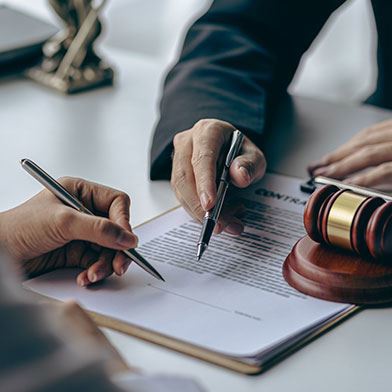


Citrus County Drug Crime Attorney
Defending Against Drug Crime Charges in Citrus, Hernando, Sumter & Marion Counties
Being arrested for a drug crime can be stressful and have long-lasting implications, as most are felony charges, and all can involve a driving license suspension if convicted. Drug arrests heavily involve the Fourth Amendment of the Constitution, and an experienced attorney will keep up with new case law updates from the District Court of Appeals and Florida and US Supreme Court to best defend you.
Bryan has handled every aspect of a drug case. He has reviewed countless search warrants for constitutional sufficiency, been present on multiple search warrants, and has heavily litigated search and seizure law in court.
Have you been accused of a drug crime? Call Caughey Law, PLLC today at (352) 645-2215 or reach out to us online to schedule a free consultation with our drug crime lawyer in Citrus County.

Whether you have questions or you’re ready to get started, our legal team is ready to help.
Florida Drug Possession Laws
Florida Statute Section 893 defines drug crimes for the state. The most common is titled possession of a controlled substance and, other than marijuana flower under 20 grams, is a third-degree felony, punishable by up to five years imprisonment. The most commonly involved substances in the Fifth Judicial Circuit are Methamphetamine, Heroin, Fentanyl, Oxycodone, and other prescription pills.
The basic elements are:
- Is the accused in possession of an item and
- is it a controlled substance?
Actual Vs. Constructive Possession
For element 1, the State can prove possession under two theories: actual or constructive. Actual possession is more straightforward and is basically if the item in question was in the accused’s hand, pocket, or similar. A recent, real-life example is that a defendant (not a client) was in court on an unrelated case, and he had an ill-advised outburst in court and was held in contempt by the judge and sentenced to jail time for the outburst. Because the defendant was going into custody, he was lawfully searched incident to arrest and found to have fentanyl in his wallet located in his pocket. This is straightforward actual possession.
Constructive possession can be much more nuanced and can be much harder to prove. Constructive possession occurs when a person is not in actual possession of the item of contraband, but the State wants to attribute them with possession. To prove a constructive possession case, the State must prove knowledge, dominion, and control of the item. Constructive possession fact patterns can occur if one is near an item of contraband, if the accused was recently in the area of located contraband, or if one is away from home when a search warrant is served, and contraband is located in the home. The State and law enforcement will try to use other evidence to attribute that contraband to a person. This outside evidence can be fingerprints on the packaging, locating personal effects, such as mail or court papers, near the item, or admissions from the accused. An important note is that in a possession of a controlled substance case, the State never has to prove ownership- just possession.
How The State Of Florida Proves a Controlled Substance
The second element the State must prove is that the item in question is in fact, a controlled substance as defined in Florida Statute section 893. The presumptive field test commonly used by law enforcement on the scene is not enough to prove what the substance is to a jury- although it may be sufficient under the relaxed evidentiary rules of a violation of probation.
The State will send the item of contraband to the Florida Department of Law Enforcement lab for testing. The FDLE analyst will use a process called gas chromatography-mass spectrometry to compare the item of evidence to a known sample of the substance in question. That FDLE analyst is required to testify at a jury trial to prove the item is a controlled substance.
Commonly identifying the controlled substance is not at issue, but with the recent proliferation of selling substances through apps like tick-tock and marketplace the FDLE lab reports are more important than ever. This is especially true in cases dealing with fentanyl and MDMA- both of which commonly come back as a different substance than expected, such as a non-controlled substance, or as other controlled substances, such as substituted cathinones or eutylone.
Florida Drug Trafficking Laws
A huge step up in severity is trafficking in a controlled substance. Trafficking is a first-degree felony, punishable by up to 30 years in prison. The legislature has also enacted certain minimum mandatory sentences depending on the weight of the item.
The basic elements of trafficking in a controlled substance are:
- possession of a controlled substance and
- weight of that substance.
Items 1 and 2 have the same analysis as possession of a controlled substance discussed above. The only difference is the weight of the substance. The State does not have to prove interstate movement, RICO or gang involvement, or even sales- just possession, controlled substance, and weight.
The analysis for possession is the same as for simple possession involving actual or constructive and utilizing corroborative evidence to prove possession. Because of the more severe nature of the charges, law enforcement will go to greater lengths to gather corroborative evidence to prove constructive possession. Finally, the State will prove the weight of the substance through the FDLE analyst. The analyst will weigh the item at the time of testing using a calibrated scale. Depending on the facts of the case and the type of substance, the weight of the item can be a contested point. Sometimes the investigating officers will field test the item and get the probable cause weight either on the scene using a non-calibrated scale or weighing the item in the packaging. Both practices are seldom noted in the report and can lead to defense-friendly surprises during trial preparation.
The threshold for trafficking weight can be very small- heroin and fentanyl trafficking thresholds start at just 4 grams. For reference, most sugar packets contain about 4 grams of sugar. When the threshold weight is so low and the stakes so high, it is crucial to understand how the analysis works and get an accurate weight without the packaging before any decisions are made.
A common question is what about if the substance in question has ‘cut’ or is otherwise diluted. Unfortunately, the statutory language is ‘a mixture containing’ and the relevant weight is of the whole item, cut of adulterations included.
Possession of a Controlled Substance With the Intent to Sell or Deliver
A third common drug-related offense is possession of a controlled substance with intent to sell or deliver, a second-degree felony. The basic elements for possession with intent are:
- that the accused possessed an item,
- that item was a controlled substance and
- had the intent to sell or deliver the item to another.
The analysis for elements 1 and 2 is the same as discussed above. If a confession or admission to distribution is made, and admissible, the case can be strong for the State. Absent a confession, the State will often use circumstantial evidence to try to prove the intent to deliver element. This type of evidence can be the amount of the substance in question, and the overall types of controlled substances, if multiple are found together, this is referred to as a ‘candyman’ theory or the manner in which the items are packaged. The State can use cash located near the substances to infer sales or delivery, as well as the presence of a firearm to help the jury conclude the intent to deliver element.
At trial, the State typically designates a detective from the narcotics unit as an expert witness and has them testify why the packaging, amounts, and location are consistent with distribution. With a potential of 15 years in prison, it is important to have an advocate that can take on an expert witness and defend against circumstantial evidence presented to the jury.
Reach out to us today at (352) 645-2215 or contact us online to learn more about how our Citrus County drug crime attorney can help.

Experienced Representation Against Drug Crime Charges
Hire Bryan, the Logical Choice
Florida Statute 948.08 states that any first offender or person previously convicted of one nonviolent misdemeanor or less and is charged with a misdemeanor or felony in the third degree is eligible for Pre-trial intervention (PTI). PTI allows your charges to be dropped if you complete conditions that may include, fines, fees, courses, community service, etc.
Contact Our Offices
Whether you have questions or you’re ready to get started, our legal team is ready to help. Complete our form below or call us at (352) 645-2215.






